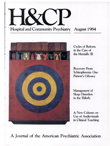A Psychoeducational Approach to Educating Chronic Mental Patients for Community Living
Abstract
The psychoeducational approach to psychiatric illness addresses the need for better information about mental illness and its treatment for the patient and family. Most programs focus on the family and its involvement with the patient; in a social rebabilitation program in Sacramento, California, the staff use psychoeducational techniques with chronic psychiatric patients living in the community apart from their families. Educational approaches are employed in all aspects of the program but are most extensively used in the transitional employment service, through work readiness seminars and a graduated continuum of volunteer service, training, and employment; in the adult basic education program; and in the medication education project, which includes weekly seminars for patients and a variety of written materials.
Access content
To read the fulltext, please use one of the options below to sign in or purchase access.- Personal login
- Institutional Login
- Sign in via OpenAthens
- Register for access
-
Please login/register if you wish to pair your device and check access availability.
Not a subscriber?
PsychiatryOnline subscription options offer access to the DSM-5 library, books, journals, CME, and patient resources. This all-in-one virtual library provides psychiatrists and mental health professionals with key resources for diagnosis, treatment, research, and professional development.
Need more help? PsychiatryOnline Customer Service may be reached by emailing [email protected] or by calling 800-368-5777 (in the U.S.) or 703-907-7322 (outside the U.S.).



